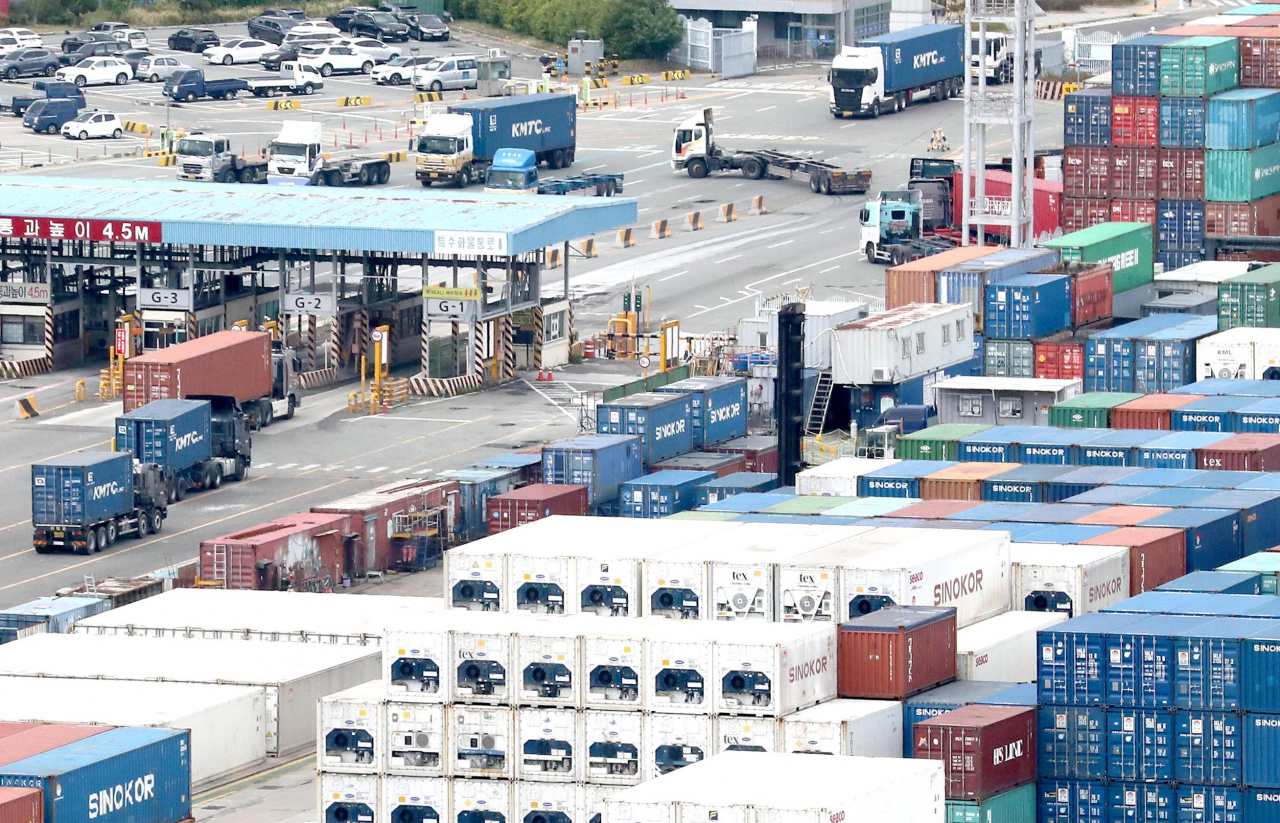Cargo truckers go on strike
Drivers demand government guarantee minimum cargo rates; Yoon vows stern response to irregularities
By Kim Da-solPublished : June 7, 2022 - 09:43

South Korea’s unionized cargo truckers staged a nationwide, indefinite strike starting Monday midnight, marking the first major labor-government conflict since President Yoon Suk-yeol took office last month amid a worsening market economy and sharp price hikes here.
According to the union, a majority of the 25,000-member Cargo Truckers Solidarity, affiliated with the Korean Confederation of Trade Unions, and a large number of non-unionized truckers have joined the general strike. They are demanding that the government protect their wages through measures such as freight rate hikes.
But the Transport Ministry played down the scale of the sit-in protest, saying only some 8,000 members have participated in the strike kick-off event held in the morning.
The strike is set to last for an unspecified period of time.
President Yoon told reporters that he would respond to any kind of irregularities in accordance with the law and principles.
The government also issued an emergency transport measure across the country, dispatching the government’s transport trucks at hub logistics terminals. The ministry said the country’s 12 ports have been under normal operation as of Tuesday afternoon.
According to industry insiders, the general strike caused logistics disruptions at several places on Tuesday, including the interruption of a cement shipment at a logistics terminal in Uiwang, Gyeonggi Province and other cement factories located in North Chungchung and Gangwon Provinces. Hyundai Steel’s Pohang factory also cancelled the shipment of 9,000 metric tons of their product due to a logistics disruption on the same day. Posco said of the 50,000 metric tons of steel products shipped on daily basis, 20,000 metric tons worth have been cancelled for shipment.
The country’s largest liquor maker HiteJinro said it has also temporarily suspended product shipment at its Cheongju factory. Another liquor maker, Oriental Brewery (OB), said it has only shipped 20 percent of its usual amount.
Convenience stores have also adjusted their orders of liquor products.
Emart24 said it has restricted its store owners to order only up to three boxes of 360-millimeter bottles of HiteJinro beers, while 7-Eleven has also limited up to one box each for soju products.
This nationwide strike by cargo truckers has been widely expected since last month after they threatened to go on a strike with surging diesel prices destabilizing their livelihoods.
They are demanding an extension of the Safe Trucking Freight Rates System, a program introduced in 2020 to prevent dangerous driving and guarantee minimum cargo rates for truck drivers. The system was adopted for a three-year run and will end on Dec. 31 this year.
Cargo truckers also argue that the recipients of the Safe Trucking Freight Rates System should be expanded, as the current regulation only covers cargo trucks that carry containers and cement products. Some 26,000 of a total of 42,000 cargo truckers fall under this category.
“Considering the impact that our strike would give to the national economy, we have tried our best to open a conversation with the government, but we have not heard anything back,” said an official from the union.
The government and the union held the first round of talks on Thursday last week but ended without reaching a compromise.
The government says the unionized cargo truckers lack the rationale to go on strike, hinting at taking strict countermeasures for causing logistics disruptions.
“The (unionized cargo truckers’) strike will impose a huge burden on our economy and citizens here. We will treat any issues or irregularities that hamper logistics transportation with the law and its principals,” said Prime Minister Han Duck-soo.







![[Graphic News] More Koreans say they plan long-distance trips this year](http://res.heraldm.com/phpwas/restmb_idxmake.php?idx=644&simg=/content/image/2024/04/17/20240417050828_0.gif&u=)
![[KH Explains] Hyundai's full hybrid edge to pay off amid slow transition to pure EVs](http://res.heraldm.com/phpwas/restmb_idxmake.php?idx=644&simg=/content/image/2024/04/18/20240418050645_0.jpg&u=20240419100350)






![[From the Scene] Monks, Buddhists hail return of remains of Buddhas](http://res.heraldm.com/phpwas/restmb_idxmake.php?idx=652&simg=/content/image/2024/04/19/20240419050617_0.jpg&u=20240419175937)

![[KH Explains] Hyundai's full hybrid edge to pay off amid slow transition to pure EVs](http://res.heraldm.com/phpwas/restmb_idxmake.php?idx=652&simg=/content/image/2024/04/18/20240418050645_0.jpg&u=20240419100350)

![[Today’s K-pop] Illit drops debut single remix](http://res.heraldm.com/phpwas/restmb_idxmake.php?idx=642&simg=/content/image/2024/04/19/20240419050612_0.jpg&u=)